Japan Relaxes Constitutional Bar Limiting Military To Self-Defense
Nearly seventy years after the end of World War Two, Japan has approved a change to its Constitution that was imposed in the post-war era largely to prevent the rise of a militaristic Japan:
Japan’s cabinet has agreed on a proposal to end a ban on its military fighting abroad, a major shift away from the country’s post-war pacifism and a move that is riling China.
Defense Minister Itsunori Onodera confirmed the new rules on Tuesday, in a move seen as a political victory for the conservative Prime Minister Shinzo Abe.
The change will significantly widen Japan’s military options by ending the ban on exercising “collective self-defense,” or aiding a friendly country under attack.
It will also relax limits on activities in U.N.-led peacekeeping operations and “gray zone” incidents short of full-scale war.
The proposal does not change the wording of Japan’s post-war, and U.S.-drafted, charter, rather the way the words are interpreted.
Article 9 of the Japanese constitution, which has not been revised since it was adopted after Japan’s 1945 defeat, only allows for a self-defense force.
In the capital of Tokyo on Tuesday, people gathered in front of Abe’s official residence to protest the plan to expand its military role abroad.
Hundreds of protesters, including pensioners and labor union members, marched carrying banners and shouting, “Don’t destroy Article 9” and “We’re against war.”
“I’m against the right of collective self defense, but more importantly, I’m against the way Abe is pushing this change through,” said 21-year-old university student Misa Machimura.
There was a time when a move like this would have raised fears of a reasertive Japan among many nations in Asia. Today, though, the nation raising concerns in that part of the world is China, which continues to make territorial claims against islands and areas of the sea controlled by Japan, South Korea, and The Philippines. Given that, the idea of a Japan that is more willing and able to take part in collective self defense efforts in the region will likely be seen as a potential counterbalance against China although, obviously, the bulk of that role is one that will have to be fulfilled by the United States along with allies in South Korea, Australia, and, now, Japan.
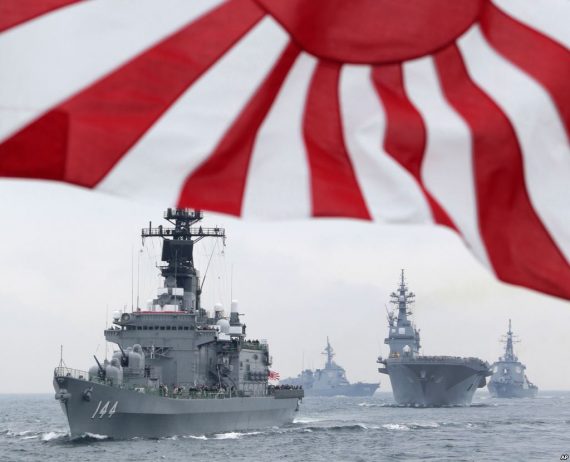

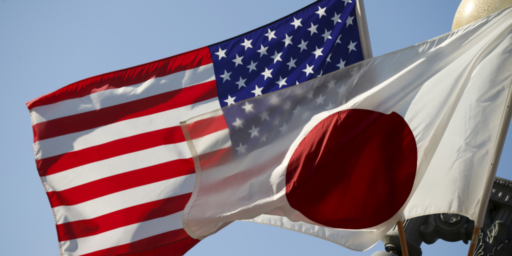
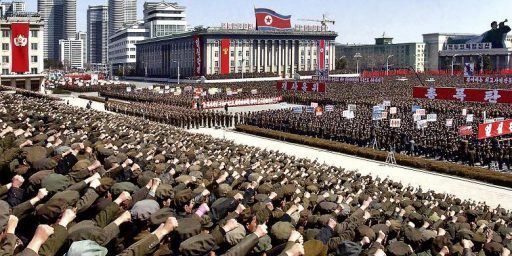
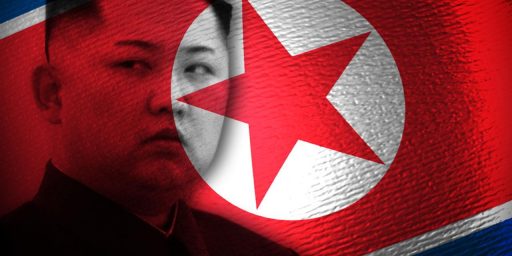
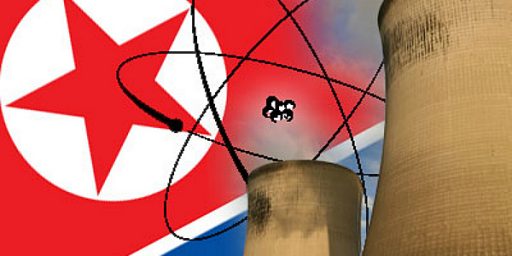
It was bound to end eventually. The only surprise here for me would be if Japan did this unilaterally, or didn’t consult us in some way before doing so.
I don’t think the Koreans will be greeting this news with happiness. Look up Dokdo. I think this may push Korea to be more neutral and if the Japanese remilitarize and have further historical revisionist faux pas, it may even align with China against Japan.
@DC Loser: Superficially, the appearance of the PRC’s assertiveness in the Pacific would serve to unite VietNam, the Philippines, Korea and Japan. But I think you are correct, my friend, that the depth of hard feelings that the Japanese military government of the ’30’s and ’40’s makes this politically unlikely. And it’s worth mentioning that the Chinese have their own reservoir of resentment against the Japanese which is at least equally well deserved.
Looks like Shinzo Abe finally got what he’s been angling for for years.
It never ceases to amaze me the naivete shown by US policymakers and think tank types when dealing with these types of very strong nationalist feelings, and about foreign nations’ hot buttons in general. What makes sense for us many times do not for our foreign friends.
I have worked for two Japanese Companies in the US, lived in Japan for 2 years and have had several Japanese friends. The Japan of today is not the japan before or during WWII. I for one look forward to their willingness to share defense responsibilities in the region.
@JohnMcC: While memories might be long, what kind of trade relationship do Japan and Korea have with each other? Wonder what part that plays.
Most people don’t know that Japan’s navy is very large, having surpassed Britain’s many years ago. Japan’s navy was fourth-largest in the world in 2012. However, what the navy lacks is offensive “throw” capability. It has no carriers, for example, and only three landing craft (again, as of 2012). So for Japan to shift to the mission types discussed here, they will have to majorly reconfigure their navy.
How many of you have talked to a Bataan Death march survivor personally? Not some 80 year old veteran, but a 25 year old who was back in the US talking about his experience the year after it happened. And not just one but dozens of survivors. I was alive in 1945 and heard many of their stories firsthand as a kid.
Ron Beasley wrote, “The Japan of today is not the japan before or during WWII.”…yes it is not the same Japan because of what Douglas MacArthur and the Occupation did to destroy any militaristic or offensive capabilities by adoption of Article 9 and the destruction of the war leaders philosophy which lead them directly to Hiroshima and Nagasaki.
We see stories of the Japanese people cleaning up after themselves at the World Cup games and see them stoically wait in line in a manifestation of total civility after the tsunami and earthquake of 3-11 and we marvel at their manners and politeness.
Its almost impossible to square this version of the current Nihonjin with the callous, barbaric, inhuman acts perpetrated against our GIs and the civilians populations of China and Korea during WW2.
Those of you who believe this is an innocuous update to Article 9 never spoke to the shattered men who saw their buddies beheaded or bayoneted, at random, for no reason, on the trail from Corregidor to Pampanga.
A genie was let out of the bottle by the Tojo militarists and the fact that the gentle, polite populace of Japan could be capable of such acts of evil is the exact reason that this changing of the Article’s intent is so alarming and so wrong.
“If it ain’t broke, break it” I guess is the new motto of our insane war policies of constant fomenting of world strife for the benefit of an obscenely bloated defense budget.
I can’t stress enough the negative ramifications to the rest of southeast Asia to this new wording.
Its truly amazing that the US is forcing the Japanese to change the very same Constitution that we wrote for them to sign in the firstplace.
@the Q: One could say the same thing about the Germans–how could a populace who produced people like Goethe end up committing the war crimes they did?
Actually, part of Japan’s problem is that they don’t have a cultural history of dealing with the outside world. If you’re an island nation, it’s easier to impose a total blockade on the outside world, which is what the Japanese did for centuries.
If you want to get miffed at anyone, get miffed at Admiral Perry sending the gunboats out to open up Japan. The Japanese then looked at the outside world, they investigated, and they copied. Everyone else was having colonies, so the Japanese decided that they should as well. Unfortunately, this started just as the rest of the world was drawing back from colonies….
P.S. Also, the LDP has been trying to get Article 9 revoked for donkey’s years. The fact that even now they’ve only managed to bend it–and in the light of the protests–I don’t think we’ll have to worry that much that soon.
Japan has this idea that turning “anti-military” and “never again” after Hiroshima and Nagasaki is what allowed Japan’s economy to become the powerhouse it turned into. I foresee more tweaking, but no real change. One member of the Japanese government pointed out to me that it would be very easy for any other country with nukes to take out all of Japan with a ridiculously small number of nukes. simply because of the small scale of the country. And no, you are NOT going to get nukes back into the Japanese defense system. The population would go nuts. They make enough of a fuss when a U.S. nuclear sub shows up.